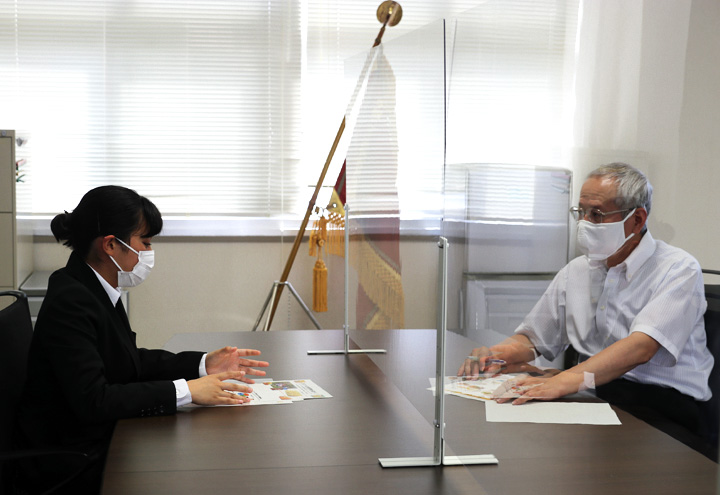2021.09.16
Ena Kidani (4th-year of the Department of Chemical and Biological Engineering) who is one of the two selected students for “TOBITATE Study Abroad Japan University Student Course” visited President Yamakawa and made a presentation of the study abroad plan to him in addition to reporting to be selected the program on Tuesday, July 20.
 Presenting the plan to President Yamakawa |
Ms. Kidani will go to study at MARA University of Technology in Malaysia for one year from next April and she will research fermented food Tempeh that people in Southeast Asia eat. She studied in Indonesia when she was a 2nd-year student in the main course as she was selected for TOBITATE Study Abroad Japan Highschool Student Course.
She will research how Malaysian have accepted Tempeh originated from Indonesia and also survey/ study how Tempeh can be accepted to other countries.
 Group picture |
Student Comment
Ena Kidani (4th-year of the Department of Chemical and Biological Engineering, Natural Sciences/Cross-Disciplinary Course)
I will go to research “Tempeh” which is a fermented food that originated from Indonesia at MARA University of Technology in Malaysia for one year from next April.
Tempeh is like Natto in Japan and people in the world have been paying attention as “protein source substitutes meat” recently. I have a goal that is “to create a system to produce Tempeh under any environment in the world and establish “a food genre of Tempeh” as a substitution method of taking protein” in the future, so I will go to Malaysia to achieve my goal.
The reason why I chose Malaysia is that people in Malaysia eat Tempeh that originated from Indonesia as comfort food and it became one of their food cultures. It is necessary to respond to the targeted local needs to expand a market for any products including food. Tempeh in Malaysia is one of the successful examples and I think I can learn a change in cultures and food in each region by studying in Malaysia. Furthermore, I think it is possible to make Tempeh that suits more to the specified region if Tempeh can be made from beans other than soybean. I will research mainly production methods and nutrient differences, such as what kind of difference Tempeh shows based on a change in environment and type of beans.